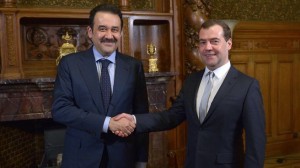 ASTANA – Kazakh Prime Minister Karim Massimov met with his counterparts from member states of the Customs Union (CU) and Common Economic Space (CES) on April 15 in Moscow to discuss the ongoing process of Eurasian economic integration.
ASTANA – Kazakh Prime Minister Karim Massimov met with his counterparts from member states of the Customs Union (CU) and Common Economic Space (CES) on April 15 in Moscow to discuss the ongoing process of Eurasian economic integration.
During the meeting, Prime Ministers Massimov, Dmitry Medvedev of Russia and Mikhail Myasnikovich of Belarus discussed deepening Eurasian economic integration, as well as reviewed preparation of the treaty on the Eurasian Economic Union (EEU) in the lead up to the meeting of presidents and a session of the Supreme Council in Minsk at the end of April.
“In particular, the parties discussed a number of issues relating to the oil and gas industry, agriculture, road and rail communications,” the Kazakhstan Prime Minister’s office reported.
“Today, we have discussed all disputable issues and after finalising the document will be ready for signing by the heads of state,” Massimov said at the press conference after the meeting.
“Throughout the negotiation process we were acting on the basic principle … of meeting economic interests of the participating countries,” he stressed.
In his turn, Medvedev welcomed Massimov and his new government and expressed his and his Belarussian counterpart’s shared desire to work together. “We wish all of you, and Mr. Massimov personally, success in reaching Kazakhstan’s national goals,” Medvedev said.
During the meeting Medvedev noted the prompt organisation of the meeting of CES prime ministers in Moscow to discuss current issues, including a draft treaty on the Eurasian Economic Union.
“Our countries are moving towards the formation of this union. We’ve formed a common customs territory and introduced CES framework agreements. A substantial number of our national powers have been transferred to our partners from the organisation’s supranational body, the Eurasian Economic Commission, something we are still getting used to. Now we are proceeding to an even higher level of integration,” Medvedev said in his opening remarks.
“Our cooperation in this trilateral format has produced concrete results, such as fewer trade barriers, which can partially make up for the reduction of external demand and alleviate some of the consequences of the financial crisis,” he continued.
Talking about trade turnover within the Customs Union last year, Medvedev said it exceeded $64 billion, which he called an impressive figure. He also mentioned that the institutional changes are no less important.
“The terms of the CES have given businesses the opportunity to locate in places where there are fewer administrative barriers and it is easier to do business. At first glance, this may not seem good for our national interests. However, in the context of the CES, this represents real competition between jurisdictions, which was our goal,” he added.
Massimov also held bilateral meeting with Medvedev as they discussed further development of Kazakh-Russian cooperation and further interaction within the Customs Union and CES.
The officials praised the level of bilateral cooperation and reaffirmed the interest of the two countries in further deepening ties across the spectrum of inter-state relations.
Meanwhile, talks on the accession of Armenia and Kyrgyzstan to the Customs Union continue. These countries have done much to become fully-fledged participants in the integration process Kazakhstan, Russia and Belarus have been developing.
As for the treaty, it should be ready for signing by President Nursultan Nazarbayev of Kazakhstan, Russian President Vladimir Putin and President Aleksandr Lukashenko of Belarus in Astana in May and, prior to that, the three presidents will meet in Minsk later this month to finalise the document.
The formation of the future Eurasian Economic Union provides for the establishment of the freedom of capital flow and freedom of the movement of labour, services, and goods which is expected to give further impetus to the development of key industries in three countries.
According to experts, member nations of the Eurasian Economic Community, the precursor to the Customs Union and the Common Economic Space, have made considerable headway in integration, which would open up great opportunities, as well as improve the investment climate in member states.
Russia, Belarus, and Kazakhstan are founding members of the Customs Union, which is the basis for the upcoming EEU.
President Nazarbayev first mentioned the concept of a Eurasian Union during his speech at Lomonosov Moscow State University in March 1994 when he envisaged it as a mutually beneficial union of mutually respectful partners.
The treaty on the establishment of the Eurasian Economic Union is due to come into force as of Jan. 1, 2015.


